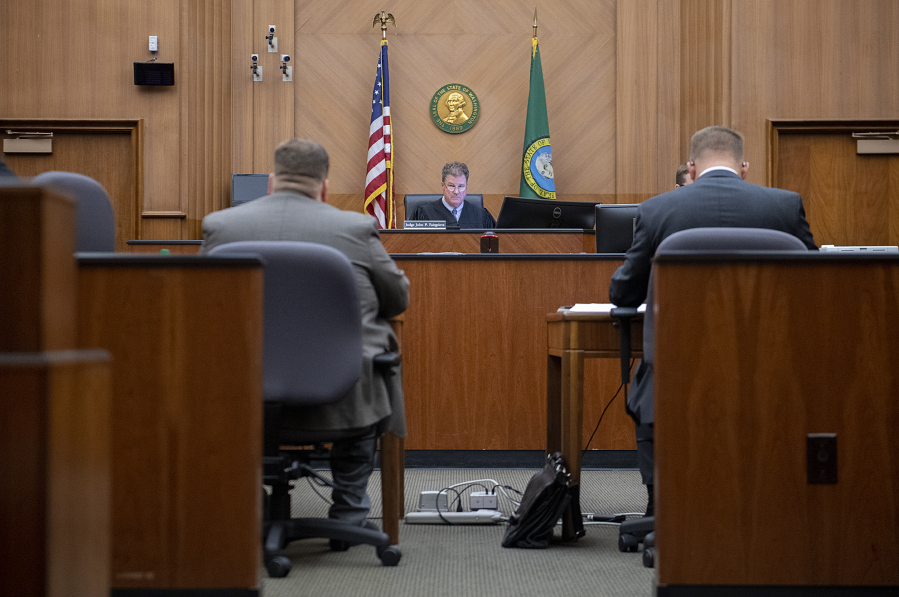As a growing number of renters in Washington face eviction, the state will soon fund more attorneys to help tenants at risk of losing their homes.
When updating the state’s two-year budget last week, lawmakers approved about $3 million in additional funding for the Office of Civil Legal Aid’s right-to-counsel program, which guarantees low-income tenants the right to an attorney as they navigate the eviction process in court.
The funding will allow the office to hire 10 more attorneys — reaching a total of 80 attorneys statewide — to handle cases across Washington, particularly in the corners of the state with the highest eviction numbers: the Seattle area, Clark County and Spokane County, said Philippe Knab, who manages the program at the Office of Civil Legal Aid.
“The Legislature did affirm its commitment to low-income Washington residents at imminent risk of evictions,” Knab said Friday, adding that the right-to-counsel program “promotes fairness.”
Still, Knab said, the state needs to take more action to address root causes of housing instability and homelessness.
Some landlords have questioned spending state funds on tenant attorneys. Sean Flynn, executive director of the Rental Housing Association of Washington, said the state should instead pay for financial assistance for tenants behind on their rent.
“Resolving an issue earlier with [rent assistance] would end up with less people in the system and thus less need for the lawyers,” he said.
In 2021, Washington became the first state to guarantee legal representation for low-income tenants facing eviction. Other states have since followed. Supporters say the change is about balancing the scales in a complex and confusing legal process where landlords typically show up in court with a lawyer but tenants rarely do without legal aid programs.
The Office of Civil Legal Aid requested additional funding last year after a sharp spike in eviction cases.
The uptick followed the end of the last temporary pandemic-era tenant protections, including eviction moratoriums and requirements that Washington landlords attempt mediation with tenants before seeking an eviction and offer them a payment plan for certain debt. Other protections remain in place, such as state limits on no-cause evictions and Seattle’s limits on evictions during the winter months and school year. But in many corners of the state, the eviction process is largely back to pre-pandemic norms.
Key sources of financial assistance for renters introduced earlier in the pandemic also dried up. In King County, the court that handles evictions is so backed up that cases can take months to resolve. Together, all of those factors led landlords to file more eviction cases, according to advocates on both sides of the process.
Eviction filings began climbing as various limits expired in 2021 and 2022, then shot up further last year as the final protections lapsed. Statewide, filings remain higher than before the pandemic. Washington landlords filed about 2,000 eviction cases in January, more than twice as many as in January 2023 and 55% higher than in January 2020, just before the pandemic upended the economy, according to state data.
In recent months, cases have jumped especially in King County, where landlords filed more than four times as many cases in January as in January 2023. But compared with pre-pandemic, the increase is especially sharp in Clark and Spokane counties. Since 2020, rents in those counties have climbed 22% and 31%, respectively, well above the 6% increase in King County, according to the data firm Apartment List.
Attorneys have represented tenants in about 15,000 cases, most stemming from unpaid rent, since the right-to-counsel program rolled out.
A review of the first two years of the program by University of Washington researchers noted difficulty finding enough attorneys to staff the program and attorney burnout. But for tenants, they wrote, “legal representation mitigated some of the most harmful impacts of receiving an unlawful detainer notice.”
Tenants often faced “multiple threats to housing stability and wellbeing, and the presence of appointed counsel often helped prevent evictions which could have led to worse outcomes including homelessness,” the report said.
Cases cost the program about $1,300 each on average, and about 15% of cases ended with a negotiated deal allowing the tenant to stay in their home, according to the report. Roughly a quarter of cases ended with a negotiated agreement for the tenant to move, and 15% ended with a writ of restitution, the legal order requiring a tenant to leave.
With the new funding, the appointed counsel program now has a budget of about $18 million for the coming year.



